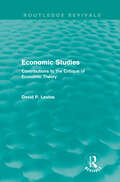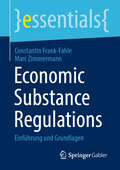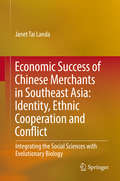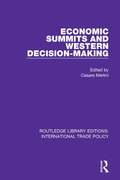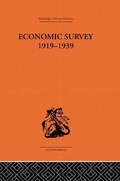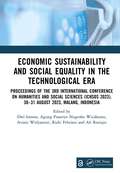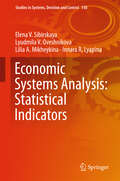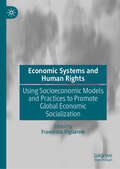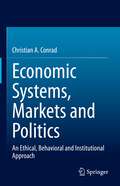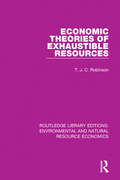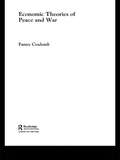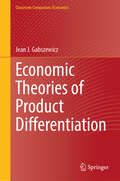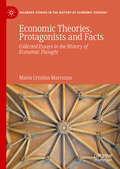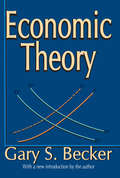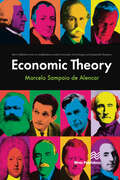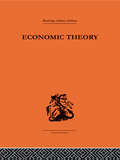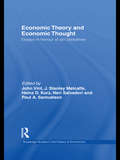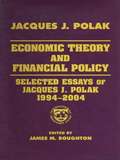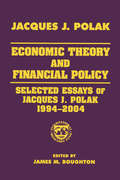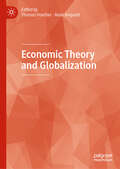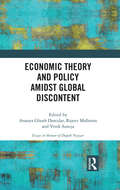- Table View
- List View
Economic Studies: Contributions to the Critique of Economic Theory (Routledge Revivals)
by David P. LevineFirst published in 1977, David Levine's Economic Studies offers a critique and reconstruction of the theoretical conception of economic life. The premise of the study is that only an investigation of the system of elementary economic relations - value, capital, production - can overcome the confusion and misdirection which baffles progress in all areas of economic theory, and lay the foundation for further development of economic science. Levine discusses both the origins of economic science and the character of contemporary economic thought. He presents a critique of the ideas of classical political economy and of the notion of a 'labor theory of value' which excludes the possibility of a science of economic relations.
Economic Substance Regulations: Einführung und Grundlagen (essentials)
by Marc Zimmermann Constantin Frank-FahleInternational angelegte Steuervermeidungsstrategien von Unternehmen sind in der Vergangenheit in den Fokus der öffentlichen Wahrnehmung gerückt. Offshore-Strukturen wurden u. a. durch multinationale Unternehmen zur Gewinnverlagerung und -verkürzung genutzt. Die OECD hat als Antwort darauf einen BEPS-Aktionsplan entwickelt, der zur Bekämpfung dieser Praktiken vorsieht, dass die Gesellschaft bei Ausführung einer relevanten Tätigkeit eine wirtschaftliche Substanz (Economic Substance) aufweisen muss. Die seitens der OECD aufgestellten Mindestanforderungen bilden den internationalen Standard und wurden in zahlreichen Niedrigsteuerjurisdiktionen umgesetzt. Das essential vermittelt kompakt das erforderliche Grundwissen zu Economic Substance Regulations und informiert praxisnah über deren Umsetzung in den einzelnen Staaten.
Economic Success of Chinese Merchants in Southeast Asia
by Janet Tai LandaThis book provides an original analysis of the economic success of Overseas Chinese merchants in Southeast Asia: The ethnically homogeneous group of Chinese middlemen is an informal, low-cost organization for the provision of club goods, e. g. contract enforcement, that are essential to merchants' success. The author's theory - and various extensions, with emphasis on kinship and other trust relationships - draws on economics and the other social sciences, and beyond to evolutionary biology. Empirical material from her fieldwork forms the basis for developing her unique, integrative and transdisciplinary theoretical framework, with important policy implications for understanding ethnic conflict in multiethnic societies where minority groups dominate merchant roles.
Economic Summits and Western Decision-Making (Routledge Library Editions: International Trade Policy #8)
by Cesare MerliniSince 1975 the leaders of the major western economies have gathered in annual summit meetings to try to agree a unified response to the main political and economic problems facing them. This book, first published in 1984, traces the development of the summit meetings and tries to assess their impact on western decision-making and international relations in general. The summits arose as the product of a serious crisis that shook the world economy in the early 1970s. They have been sustained because of the waning of the American hegemony that had supported the postwar international economic regime. From this it became vital for the leaders of the major economies to reassert collective leadership in order to try to re-establish a new world economic equilibrium.
Economic Survey
by W. Arthur Lewis'A masterpiece of succinct analysis.'New Statesman 'Penetrating in analysis and closely packed in thought.' Financial Times Analysing and examining the history of the economic events of the inter-war years, this book gives the reader both a sense of perspective of the larger scene of events on an international scale, whilst introducing facts and theories. National policies of the UK, France, Germany, the USA, Japan and the former Soviet Union are discussed as are developments in international trade.
Economic Sustainability and Social Equality in the Technological Era: Proceedings of the 3rd International Conference on Humanities and Social Sciences (ICHSOS 2023), 30–31 August 2023, Malang, Indonesia
by Ali Roziqin Dwi Irawan Agung Prasetyo Nugroho Wicaksono Aviani Widyastuti Rizki FebrianiThis book is a comprehensive compilation of academic papers and presentations delivered at the conference. It brings together research from various disciplines within the humanities and social sciences, such as cultural studies, sociology, psychology, education, literature, and history.It meticulously covers several critical areas of study, reflecting the diverse and interdisciplinary nature of the conference. In the realm of post-pandemic economic development, it explores strategies for economic recovery and resilience, highlighting the role of finance and social capital in rebuilding economies. Technology and sustainable cities are examined through case studies and theoretical frameworks that discuss smart city initiatives, technological integration, and sustainability practices. The section on economic development, accountability, and finance risk delves into methods for ensuring transparency and managing financial uncertainties in a globalized economy. Social and environmental policies and planning are addressed with a focus on creating equitable and sustainable communities.This text will be valuable to academics, researchers, and students in the fields of humanities and social sciences.The Open Access version of this book, available at http://www.taylorfrancis.com, has been made available under a Creative Commons [Attribution-Non Commercial-No Derivatives (CC-BY-NC-ND)] 4.0 license.
Economic Systems Analysis: Statistical Indicators (Studies in Systems, Decision and Control #158)
by Elena V. Sibirskaya Lyudmila V. Oveshnikova Lilia A. Mikheykina Innara R. LyapinaThis book explores a wide range of issues related to the methodology, organization, and technologies of analytical work, showing the potential of using analytical tools and statistical indicators for studying socio-economic processes, forecasting, organizing effective companies, and improving managerial decisions. At the level of “living knowledge” in the broad context, it describes the essence of analytical technologies and means of applying analytical and statistical work. The book is of interest to readers regardless of their specialization: scientific research, medicine, pedagogics, law, administrative work, or economic practice. Starting from the premise that readers are familiar with the theory of statistics, which has formulated the general methods and principles of establishing the quantitative characteristics of mass phenomena and processes, it describes the concepts, definitions, indicators and classifications of socio-economic statistics, taking into consideration the international standards and the present-day practice of statistics in Russia. Although concise, the book provides plenty of study material as well as questions at the end of each chapter It is particularly useful for those interested in self-study or remote education, as well as business leaders who are interested in gaining a scientific understanding of their financial and economic activities.
Economic Systems and Human Rights: Using Socioeconomic Models and Practices to Promote Global Economic Socialization
by Francesco VigliaroloEconomic systems driven by monetary interests have enabled individuals, international institutions, and governments to prioritize financial gain and budget constraints over people. This has placed global dominance above human rights. This edited volume tackles the relationship between human rights and economic systems, providing new ways to help countries prioritize human rights in their economies. It includes contributions from scholars actively involved with the UNESCO Chair in Economic Systems and Human Rights, founded at the National University of La Plata. These contributors specialize in a range of topics within different disciplines, including economics, sociology, history, geography, law, and philosophy. Providing historical insights into past and present conditions, the contributors explore the best ways to reform modern economic systems to ensure they promote human rights. The first half of the book includes theoretical proposals and underlying themes, while the second half offers concrete models and practices for use in today’s dominant economic systems. Unique contributions within chapters include frameworks readers can use to apply socioeconomic theory at both national and international levels. The book examines structural problems such as socio-environmental crises, increased rates of inequality, and gaps between the economy and society. It discusses the transformation of dominant socio-economic theory as it relates to financial systems, productive labor markets, social participation, and the relationship between the economy, society, and the environment. Chapters directly address the loss of the ontological function in economies and propose new approaches to existing economic systems, drawing on scholars such as Adam Smith, who is well-known for his idea of the “invisible hand.” The resulting book presents a modern approach to national and international well-being built around human rights. Readers will learn about the socioeconomic models and practices that best promote economic socialization and how this relates to global values shared across economies.
Economic Systems, Markets and Politics: An Ethical, Behavioral and Institutional Approach
by Christian A. ConradThis textbook takes a new approach to economics by taking into account behavioral sciences and ethics. The basics of institutional economics are the starting point of the book, which are combined with insights from business ethics and behavioral science. It analyzes human behavior in order to discover incentives for economic agents to behave in a welfare-maximizing way, and analyzes the impact of human behavior and morality on economic systems, markets and politics. This textbook draws from new research results from behavioral economics, as well as from other disciplines, such as psychology and sociology, thus leading to new conclusions for economic science. The book sheds light on how people behave and how such behavior can be guided towards moral welfare for everyone. Furthermore, the reader is introduced to behavioral games, and to how these can be used to study economic behavior. Each chapter contains a summary on behavioral science findings as well as one on ethical findings. This book is a must read for advanced students in economics and political science but can also be of use to researchers of economics, as well as policymakers and business executives due to its focus on applications.
Economic Theories of Exhaustible Resources (Routledge Library Editions: Environmental and Natural Resource Economics)
by T. J. RobinsonOriginally published in 1989. Professor Robinson begins by examining natural resource classification and the nature of return in mining, giving particular emphasis to different sources of long-run price changes in mining and their relevance for user cost and the economic treatment for exhaustible resources. He then traces the development of the economic theory of exhaustible resources from the last quarter of the eighteenth century to the first quarter of the twentieth, documenting the differing views of various authors about the future availability of mineral resources and the extent of user cost involved in their exploitation. He identifies a link between the perceived availability of exhaustible resources and the nature of the economic theory used to explain their exploitation. This book should be of interest to students and researchers of Economic Theory and Policy.
Economic Theories of Peace and War (Routledge Studies In Defence And Peace Economics Ser.)
by Fanny CoulombWar often comes down to one thing: money. The role of economics in the study of both peace and war is arguably then the most important single factor when it comes to the study of defence. This excellent new book from Fanny Coulomb will be of interest not only to those involved in the burgeoning field of defence economics - it will also be of vital
Economic Theories of Product Differentiation (Classroom Companion: Economics)
by Jean J. GabszewiczThis book provides a comprehensive exploration of product differentiation, blending insights from industrial organization, spatial economics, and game theory. In modern economies, nearly every product—from consumer electronics to household goods—comes in multiple variants, reflecting firms' strategic efforts to differentiate their offerings. But why do firms differentiate their products? How do they set prices for these variants? And does this process lead to an efficient market outcome? It examines both horizontal and vertical differentiation, investigating how firms compete not only on price but also on product characteristics such as location, quality, and perceived value. Special attention is given to the role of network effects, industry structure, and monopolistic competition, shedding light on how differentiation influences market dynamics. Key topics include: The historical evolution of product differentiation theories and recent advances in the field. The spatial metaphor of a differentiated industry and the structure of demand. Horizontal differentiation models, including Hotelling’s framework and political science analogies. Vertical differentiation and the role of quality, production costs, and regulatory standards. The impact of network effects on pricing, market equilibria, and two-sided markets. Monopolistic competition and its implications for excess capacity and market efficiency. With rigorous theoretical models and real-world applications, this book is essential reading for economists, researchers, and students seeking to understand the fundamental mechanisms shaping modern industrial competition.
Economic Theories, Protagonists and Facts: Collected Essays in the History of Economic Thought (Palgrave Studies in the History of Economic Thought)
by Maria Cristina MarcuzzoThis book brings together the work of Maria Cristina Marcuzzo and highlights her investigations into the history of economic thought and her quest for an alternative economic thinking. Following an extended introduction that contextualised her ideas and highlights consistent themes throughout the volume, it discusses the theoretical and methodological approaches that have come to define the history of economic thought as a discipline. The work of David Ricardo is then debated, alongside ideas of money and monetary systems. Finally, the impact of the Cambridge economists is presented, with a particular focus on Luigi Pasinetti, Joan Robinson, Piero Sraffa, and John Maynard Keynes.This book combines theoretical discussions with historical analysis, biographical narratives, and original archival researcher to provide rich insights into the history and impact of economics. It will be of interest to students and researchers working within the political economy and the history of economic thought.
Economic Theory
by Gary S BeckerOthers might have called this book Micro Theory or Price Theory. Becker's choice of Economic Theory as the title for his book reflects his deep belief that there is only one kind of economic theory, not separate theories for micro problems, macro problems, non-market decisions, and so on. Indeed, as he notes, the most promising development in recent years in the literature on large scale economic problems such as unemployment has been the increasing reliance on utility maximization, a concept generally identified with microeconomics. Microeconomics is the subject matter of this volume, but it is emphatically not confined to microeconomics in the literal sense of micro units like firms or households. Becker's main interest is in market behavior of aggregations of firms and households. Although important inferences are drawn about individual firms and households, the author tries to understand aggregate responses to changes in basic economic parameters like tax rates, tariff schedules, technology, or antitrust provisions. His discussion is related to the market sector in industrialized economies, but the principles developed are applied to other sectors and different kinds of choices. Becker argues that economic analysis is essential to understand much of the behavior traditionally studied by sociologists, anthropologists, and other social scientists. The broad definition of economics in terms of scarce means and competing ends is taken seriously and should be a source of pride to economists since it provides insights into a wide variety of problems. Practically all statements proved mathematically are also provided geometrically or verbally in the body of the text.
Economic Theory
by Marcelo Sampaio de AlencarThe book describes the evolution of economic theory, considering historical, political and scientific perspectives. It discusses economic concepts and the formation of economics as a discipline since the feudal system, passing through the formation of the State, until the present. The main economic concepts are presented, including microeconomics, macroeconomics, econometrics, privatization, taxes, tariffs, the concept of currencies, stock markets, international transactions, and economic policies. The book contains a complete glossary of economic terms to help the reader.
Economic Theory (Routledge Library Editions Ser.)
by G. B. RichardsonThis book introduces economic theory by concentrating on some of the most important matters with which theory deals. Beginning by developing the general criteria of efficiency in the allocation of resources between alternative uses, the book then illustrates how efficient allocation can be promoted directly, by state planning, or indirectly by private enterprise. An analysis of the working of business competition in both its free and restricted forms follows, and analysis of the determination of the general levels of production employment and prices is also included.
Economic Theory 12th Standard - Tamilnadu Board
by Training State Council of Educational ResearchEconomic Theory Textbook for the 12th Standard Students, preparing for Tamil Nadu State Board Exam.
Economic Theory and Economic Thought: Essays in Honour of Ian Steedman (Routledge Studies In The History Of Economics Ser.)
by John VintIan Steedman is recognised internationally as one of the leading economic theorists of his time and has made major contributions to the development of economic theory and economic thought, as substantiated by his work on Marx, Sraffa, Marshall, Jevons and Wicksteed. His contributions to economic theory include his work on time, international trade, capital theory and growth and distribution. This collection reflects the wide ranging interests of Ian Steedman and is a tribute to his outstanding contributions. This edited collection brings together twenty two new essays by distinguished economists from around the world. The papers cover a wide range of topics including; international trade – an area in which Steedman has made significant contributions; Sraffa, the history of economic thought and theoretical papers – including Faustian Agents and market failure in waste production. The essays in this book will be an invaluable source for economists interested in economic theory or in the evolution of economic thought. It will also be of interest to postgraduate and research students in economic theory and the history of economic thought. John Vint is Professor of Economics at Manchester Metropolitan University, UK. J. Stanley Metcalfe is Professor of Economics at the University of Manchester, UK. Heinz D. Kurz is Professor of Economics at the University of Graz, Austria. Neri Salvadori is Professor of Economics at the University of Pisa, Italy. Paul Samuelson is Professor of Economics at the Massachusetts Institute of Technology, USA.
Economic Theory and Financial Policy
by James M. BoughtonTwo previous collections of the works of Polak (a chief economist at the International Monetary Fund from 1958 to 1979) have collected virtually all of his published work through the early 1990s. This collection of 14 papers brings his career more up-to-date by publishing most of the remaining papers of the 1990s, covering various aspects of international financial policy. Papers grouped in a section exploring the role of the International Monetary Fund cover such topics as the history of exchange rate research at the IMF, relations between the IMF and the countries of the euro zone, and relations between the World Bank and the IMF. Other papers consider issues of Special Drawing Rights, which Polak helped create as a new type of international reserve asset. A final group of papers discuss the policy implications of monetary models. Annotation ©2004 Book News, Inc. , Portland, OR (booknews. com)
Economic Theory and Financial Policy: Selected Essays of Jacques J. Polak, 1994-2004 (Economists Of The Twentieth Century Ser.)
by James M. Boughton Jacques J. PolakAs former Director of Research and a founding member of the Executive Board of the International Monetary Fund, Jacques J. Polak has advised theoreticians and policymakers worldwide. This collection brings together his most current writings, and is published under the auspices of the IMF. The hallmark of Dr. Polak's recent research has been his ability to draw on decades of personal experience and reflection to comprehend and describe the context for current policy debates. In the past decade, he has contributed much to the debates on international financial policy and the role of the IMF, and this volume brings together most of these recent papers to make them accessible to a broader audience.
Economic Theory and Globalization
by Thomas Hoerber Alain AnquetilWhat do the economic theories of thought-leaders in economics, such as Smith, Keynes, Marx and Schumpeter, tell us about globalisation in the twenty-first century? Great economic theories have provided a narrative of how society should work in all its aspects, and can offer renewed usefulness for today's society. Each economic theory is presented for easy access, readability and simplicity; explaining the criticism a particular theory poses against its own contemporary environment, such as the poverty produced by Manchester capitalism in Marx, and then applying those historical lessons to our current time. Should some economic theories be left sitting on a shelf, safely without any impact on us, or do some great economic ideas still have something to contribute to the grand quest for a more just society in its many interpretations?
Economic Theory and Policy amidst Global Discontent: Essays In Honour Of Deepak Nayyar
by Ananya Ghosh Dastidar Rajeev Malhotra Vivek SunejaThis book rethinks economic theory and calls for a creative and pragmatic approach to policymaking. It examines what development and sustenance of economic progress mean, and how these may be facilitated. The relevance of this issue has received fresh impetus from the significant changes in the degree and pattern of international economic relations that are unfolding across the world, posing both opportunities and challenges. While globalisation of goods and financial markets may have delivered high growth for some nations, the distribution of the benefits has often been highly unequal, with gains to owners of capital and skills being disproportionately higher compared to that of labour, especially the unskilled. Widening and persistent inequalities have been at the heart of rising polarisation and spread of conflicts that threaten the social fabric. This work emphasises the relevance of a broad policy framework based on building individual capabilities and in line with a human-centric perspective. At the same time, it points out the crucial need to create policy space for macroeconomic stability and to accommodate heterodox influences, especially when conventional wisdom proves inadequate, as starkly demonstrated inter alia during the recent global financial crisis. This festschrift, dedicated to Deepak Nayyar, presents chapters on diverse themes that address the persisting global problems of poverty, inequality and sustaining development. The book will be of great interest to scholars and researchers of economics, development studies, public policy and governance, and also to policymakers, government officials and those in media.
Economic Theory and Social Change: Problems and Revisions (Routledge Frontiers Of Political Economy Ser. #131)
by Angelo Fusari Hasse EkstedtThis book is a discourse on modelling Man in a social context. Its focus is on economic main-stream theory in its capacity to handle basic problems such as uncertainty, social dynamics and ethics. The point of departure is a systematic critique of the specific methodology of economics and its axiomatic structure. The ultimate aim is to develop an economic theory for a socially sustainable society. Economic Theory and Social Change analyses the foundation of economic market theory in relation to its social implications. On rejecting the axiomatic structure of the market theory Hasse Ekstedt and Angelo Fusari analyse the concept of growth and uncertainty with respect to a more realistic modelling of man, The book also addresses central political problems and their potential solutions, including permanent unemployment, distribution of income, the interaction of real and financial growth, money and the credit system. In seeking objective values to help to obtain a socially sustainable society, the book traces a tentative revision of economic and social thought based on a deepening of some crucial features of modern economies and societies. These features include innovation, the connected flows of uncertainty, entrepreneurship, and their role in fuelling and characterizing economic growth and development. This book will be of interest to postgraduate students and researchers of Economics, particularly to those focussing on Economic Theory and Political Economy.
Economic Theory and Sustainable Development: What Can We Preserve for Future Generations? (Routledge Studies in Ecological Economics)
by Vincent MartinetIs development sustainable? When addressing the sustainability issue, decision-makers are faced with two challenges: taking into account conflicting issues, such as economic development and environmental preservation, while also ensuring intergenerational equity. Tackling these challenges amounts to deciding what should be bequeathed to future generations, especially in terms of natural resources.
Economic Theory and Western European Intergration
by Tibor ScitovskyThe union of Western Europe poses many complex and technical obstacles. Analysing the advantages as well as the difficulties, the book discusses competition and the nature and direction of the increased pressures it brings to bear upon entrepreneurial activity, through which the effects of economic union will mostly be felt.
